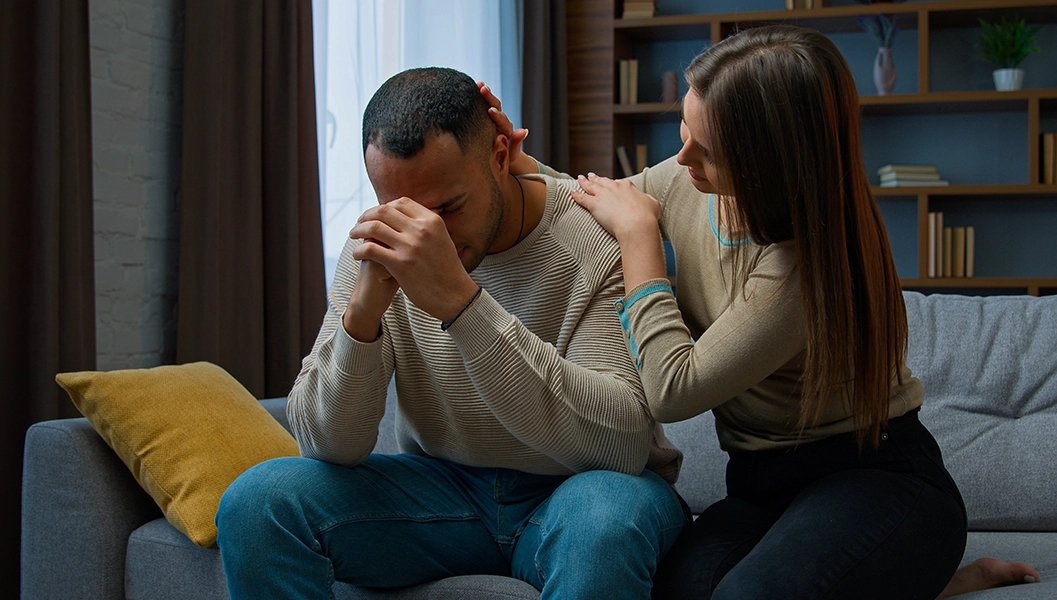How to Deal with Anxiety?

Anxiety is an uncomfortable feeling that comes with sentiments like terror, fear, anxiousness, and panic. These overwhelming feelings can interfere with daily life if not addressed with healthy coping strategies.
According to the American Psychological Association (APA), anxiety is “an emotion characterized by apprehension and somatic symptoms of tension in which an individual anticipates impending danger, catastrophe, or misfortune.”
Talk to a Licensed Therapist
Connect with certified professionals who are here to listen and guide you through life’s challenges.
Types of Anxiety Disorders
Having anxiety issues can affect a person’s personal and professional life. The Canadian Institute for Health Information recorded in 2023 that 1 in 5 Canadians suffers from anxiety every year.
Some studies suggest that a significant portion of Canada’s aging population may face an increased risk of anxiety due to health changes, isolation, or other life transitions. To better understand how anxiety develops, its symptoms and treatment options, you can also explore our In-detail Guide On Anxiety.
There are different types of anxiety disorders, including:
- Generalized Anxiety Disorder (GAD)
- Panic Disorder
- Social Anxiety Disorder
- Selective Mutism
- Phobias
- Agoraphobia
- Hoarding
- Separation Anxiety Disorder
- Obsessive Compulsive Disorder
- Post-traumatic Stress Disorder
- Body-focused Repetitive Behaviours
Major causes of these anxiety disorders are either genetics or the surrounding environment. According to various studies, anxiety can run in the family and might be passed down.
The environment can also make a person prone to developing anxiety disorders. Environmental factors like childhood trauma, abuse, exposure to violence, or chronic stressors such as grief and illness can increase vulnerability to anxiety disorders.
Symptoms of Anxiety
Anxiety disorders can develop at any age. Therefore, it’s important to be well informed of its symptoms, precautions, and management of how to deal with anxiety in a timely manner. Some of the symptoms of anxiety include:
- Panic attacks
- Helplessness
- Nervousness
- Increased heart rate
- Overthinking
- Sweating
- Feeling annoyed or irritated
- Shortness of breath
- Twitches
- Trembling
- Fatigue
- Headaches
- Diarrhea
If you notice any of these symptoms affecting your daily life, consider speaking with a healthcare professional for guidance and support.
A healthcare professional can examine and rule out the physical symptoms and underlying conditions before referring you to a psychological expert who will show you ways of dealing with anxiety.
Best Ways to Deal With Anxiety
Psychotherapy is one of the most common ways to deal with anxiety. Some famous therapies that therapists choose to lower anxiety in their patients are cognitive behavioural therapy, exposure therapy, psychodynamic psychotherapy, relaxation techniques, and interpersonal psychotherapy.
Some therapists may use standardized assessment tools to better understand your symptoms and tailor the treatment plan. These might include using:
- Yale-Brown Obsessive-Compulsive Scale (YBOCS)
- Zung Self-Rating Anxiety Scale
- Beck Anxiety Inventory (BAI)
- Hamilton Anxiety Scale (HAM-A)
- Social Phobia Inventory (SPIN)
- Generalized Anxiety Disorder Scale
After running these tests and getting their results, your therapist will brief you on how to deal with anxiety attacks.
How to Deal with Anxiety without Medication?
Although most people opt for psychotherapy when dealing with anxiety disorders, there has been research that shows that healthy lifestyle changes can be some of the best ways to deal with anxiety and can also lead to lowering it in individuals.
Some healthy tips on dealing with anxiety without medication include, but are not limited to:
- Avoid Intoxication: If you feel anxious often, avoid drinking and doing drugs, as they can heighten your senses and worsen your condition. If you have drinking or substance use issues, contact your healthcare provider or a support group.
- Trigger Identification: You can also start by identifying your stressors that cause anxiety. In some people, going into a crowd might be a trigger, while for others, loud noises might be the cause. After identifying your triggers, work on managing them. For instance, if you’re triggered by loud noises, avoid going to such places or keep noise-cancelling headphones with you.
- Exercise: Keeping yourself physically healthy is a major lifestyle change that will help you stay mentally resilient and emotionally balanced. Engaging in regular exercise can release tension and help manage anxious behaviour.
- Mindfulness Techniques: Practicing mindfulness techniques like deep breathing and other meditation methods can help deal with anxiety when you’re feeling anxious.
- Limited Caffeine Intake: Caffeine intake can interfere with your sleep routine, which in turn can be a trigger for anxiety. Limit your caffeine intake and make sure to get enough sleep throughout the night.
- Try Journaling Your Emotions: According to research, keeping a journal can be an effective way to process your emotions. It can also help deal with anxiety.
- Seek Help: Having somebody to talk to about what you’re experiencing can make a huge difference. Whether it’s a supportive friend, family member, or professional, talking about your anxiety issues can help you deal with them.
- Be Consistent: Being consistent can be the key to overcoming your anxious behaviour. Start by setting a routine and then sticking to it. This can help you identify and manage your triggers more efficiently.
- Be Patient: Being patient is likely to help you deal with anxiety more effectively. While occasional anxiety is a normal part of life, chronic or intense anxiety may indicate an anxiety disorder.
Anxiety is a common mental disorder that has been rooted in people of all ages. If making lifestyle changes doesn’t help and leaves you wondering, “How do I deal with anxiety?” It’s advised that you consult with a therapist or use a personalized tool like Saalvio. Book an appointment now.
Talk to a Licensed Therapist
Connect with certified professionals who are here to listen and guide you through life’s challenges.

